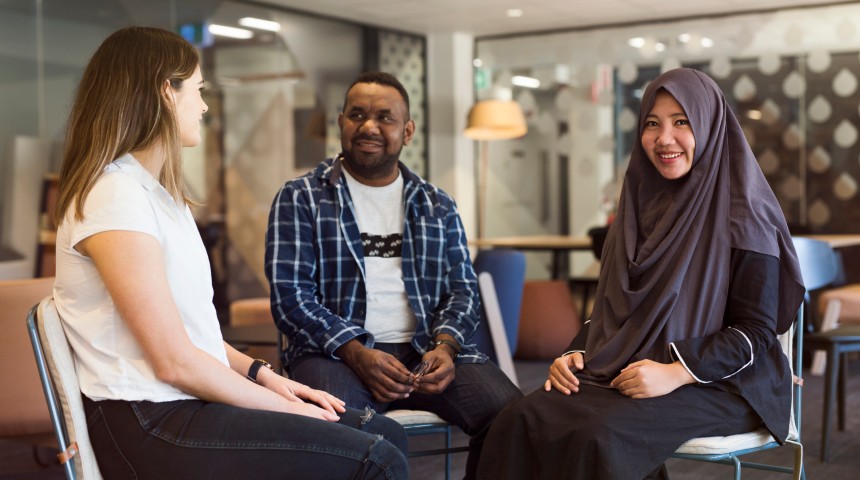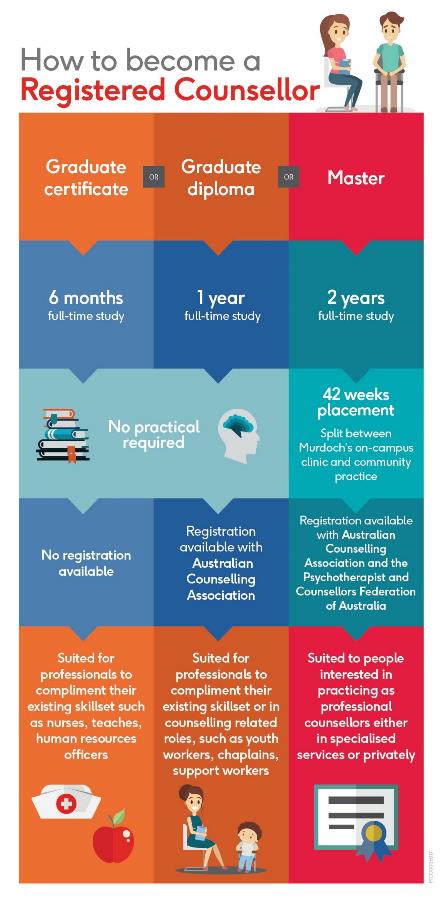
Interested in counselling or want to become a registered counsellor? There are a few different options to study counselling, so it’s important to understand what’s available and the differences between courses to know which is right for you.
At Murdoch, there are three postgraduate counselling courses available. These are:What’s the difference between counselling courses?
The main difference between the three courses is the depth of study you’ll need to complete, how long it will take to complete the degree, whether you’ll need to complete a practical, and if you’re able to register with an accrediting body once you’ve graduated. The main points of difference for each of the three courses are as follows:
Graduate Certificate in Counselling
- Six months of full-time study
- No practical required
- Registration options: None
Graduate Diploma in Counselling
- One year of full-time study
- No practical required
- Graduates eligible for Level 1 registration with the Australian Counselling Association
Master of Counselling
- Two years of full-time study
- 42-week placement split between the Murdoch on-campus clinic and community practise
- Graduates are eligible for Level 2 registration with the Australian Counselling Association and Provisional Membership of the Psychotherapist and Counsellors Federation of Australia

Which counselling course is right for me?
Choosing which course is best suited to you really depends on why you want to study counselling.The Graduate Certificate in Counselling is suited to professionals who want to develop their skills to complement their existing competencies. For example, you may be in a role which requires some type of non-formal counselling and you want basic knowledge that you can use in your day-to-day work. You might be a nurse, a teacher, in human resources or even in a management position.
Similarly, the Graduate Diploma in Counselling is suited to professionals who want to develop their skills to complement their existing competencies. However, as this is a more in-depth level of study, this course is better suited to professionals in roles that are more directly related to counselling, albeit in a non-formal context. For example, you might be a chaplain, a youth worker or support worker.
Finally, the Master of Counselling is suited to anyone who wants to become a registered counsellor. This course will give you the skills to become a professional counsellor and in specialised services or private practice.
What are the entry requirements for counselling courses?
The entry requirements for each of the three courses vary slightly, so it’s important to understand the prerequisites before applying.
For the Graduate Certificate and Graduate Diploma, you’ll need to have completed an undergraduate degree in any discipline, but it doesn’t have to be related to counselling. Direct entry into the Master’s is only possible if you’ve completed the Graduate Diploma in Counselling, or equivalent from another university.
You’ll also be assessed against training guidelines from the Psychotherapist and Counsellors Federation of Australia.
You’ll also meet need to Murdoch’s minimum English entry requirements.
You can find all the information on entry requirements on the respective course pages for the Graduate Certificate, Graduate Diploma and Master’s.